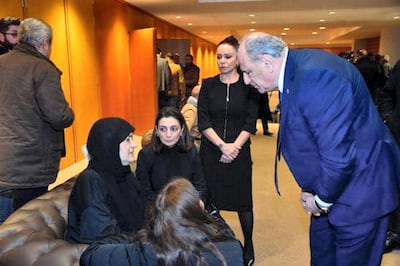Friends, family and colleagues paid tribute to leading broadcast journalist Najwa Kassem as she was laid to rest in her home town in Lebanon on Saturday.
The renowned presenter, who worked for Arabic news channels Al Arabiya and Al Hadath, died in Dubai on Thursday.
She covered some of the region's most significant events, such as the Second Gulf War in 2003 and the assassination of Lebanese prime minister Rafic Hariri in 2005.
Dubai police said Kassem, who was 51, died of a heart attack at her home in the emirate.
A funeral service was held in the Lebanese village of Joun on Saturday.
In footage of the ceremony shared by Al Hadath on Twitter, scores of mourners are seen lining the streets during the funeral procession.
Kassem's heartbroken sister said in the video that the respected journalist cared deeply about her country and her family.
Kassem had two sisters and two brothers and launched her career at Lebanese Future TV, before moving to Al Arabiya in Dubai in 2003 and later to sister channel, Al Hadath.
Tributes to the popular presenter continued to flood in on social media.
A video featuring Kassem showing her love for her country has been widely shared.
“All the love from the bottom of the hearts to Lebanon, all of our hearts are with you,” Kassem said in the video.
She presented the popular political show Hadath Al Youm (Today's Incident) on Al Arabiya and Al Hadath and in 2012 was named one of the 100 most powerful women in the Arab world by Arabian Business.
Former Lebanese prime minister Saad Hariri described Kassem’s death as a “real saddening shock” on Twitter.
He said she died “during the peak” of her career.
“It [her death] is a great loss for us and the Lebanese and Arab media," he said.
Paul Haddad, editor-in-chief at Al Hadath, said Kassem's family travelled from Beirut to the UAE to spend Christmas with her.

“The saddest thing was that her siblings came from Beirut to spend Christmas with her,” Haddad said.
“She had just moved to a new house and she was very happy. They barely spent one week with her.
“They slept after spending the night out together and woke up to find her dead. She slept and never woke up.”
Her close friend and colleague, Rola Al Khatib, said Kassem was "healthy and active" and was highly regarded for her media work.
“She was the only one I trusted to give me honest advice from the heart,” Ms Al Khatib said.
Another colleague, Husam Jubali, described Kassem as a mentor.
“We were colleagues for 13 years and she accompanied me through many stages of my career,” he said.
“I always turned to her for advice. She was a person who loved life and joy.”
He said his last encounter with her was during a desert trip in Dubai last month.
“She was expressing her love for nature,” he said.
A news package published by Al Arabiya after her death said she was originally an architect but “her passion was media”.
“She was a like a rock at home and the foundation of her family,” the article read.
“She was the first one to go to the borders and interview the Lebanese people who were living under Israeli occupation, she produced a package on Lebanese detainees in Israeli prisons and she was one of the first journalists who appeared on Future TV.”




